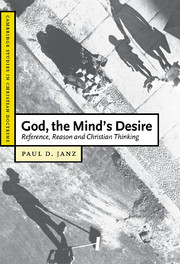Book contents
- Frontmatter
- Contents
- Acknowledgements
- 1 A reconnaissance of theology and epistemology
- 2 Theology and the lure of obscurity
- 3 Philosophy's perpetual polarities: anti-realism and realism
- 4 Philosophy's perpetual polarities: making and finding
- 5 Philosophy's perpetual polarities: act and being
- 6 The Kantian inversion of ‘all previous philosophy’
- 7 Tragedy, empirical history and finality
- 8 Penultimacy and Christology
- Bibliography
- Index
4 - Philosophy's perpetual polarities: making and finding
Published online by Cambridge University Press: 22 September 2009
- Frontmatter
- Contents
- Acknowledgements
- 1 A reconnaissance of theology and epistemology
- 2 Theology and the lure of obscurity
- 3 Philosophy's perpetual polarities: anti-realism and realism
- 4 Philosophy's perpetual polarities: making and finding
- 5 Philosophy's perpetual polarities: act and being
- 6 The Kantian inversion of ‘all previous philosophy’
- 7 Tragedy, empirical history and finality
- 8 Penultimacy and Christology
- Bibliography
- Index
Summary
Despite the unsustainable results, no less of Nagel's realism than of Putnam's idealism (that is, since both in the end merely re-emphasized the polarizations between realism and idealism, and were unable to respond properly to the anti-rational attack on reason), there is still an obvious and unavoidable sense in which orthodox theological reasoning cannot be at bottom idealist or anti-realist but must remain in some way at least oriented toward realism. Theology, after all, wants to claim to be able to speak ‘about’ God both genuinely and meaningfully, and in making this claim, it is understood that when we engage in Christian discourse we do not merely take ourselves to be participating in a specialized kind of play with our imaginations or to be engaging merely in some particularly sublime form of human ingenuity. And this in turn leads to an interesting and important preliminary result. If indeed we want our speech about God to be both genuine (that is truly about God) and meaningful (that is truly about God, in the way that meaningfulness was shown in chapter 1 to be definitionally equated with ‘aboutness’), then we cannot avoid treating the problem of Christian thinking as, in some way, a question of intentional reference, and hence also as a question of correspondence.
- Type
- Chapter
- Information
- God, the Mind's DesireReference, Reason and Christian Thinking, pp. 80 - 101Publisher: Cambridge University PressPrint publication year: 2004



